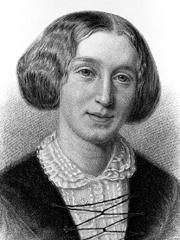Religion
Theory of Mind and Elevated Religiosity
Theory of Mind Aptitude and the Gender Gap in Religiosity
Posted January 9, 2013
The Lady Novelist

The Lady Novelist
As they do each winter, the New York Gilbert and Sullivan Players have commenced their G&S Fest 2013 – beginning the season with the most frequently produced of Gilbert and Sullivan’s operettas, The Mikado. In this timeless classic, the citizens of Titipu have aimed to circumvent the Mikado’s command that flirting be treated as a capital crime by appointing a local tailor, Ko-Ko, as the town’s Lord High Executioner. Since Ko-Ko has himself been found guilty of flirting and is the next to be executed, they reasoned that his inability to decapitate himself would forestall any other executions. Early in the show Ko-Ko sings one of Gilbert and Sullivan’s famous “patter” songs, in which he assures the town’s citizens that, if an execution must occur, he’s “got a little list” of candidates made up of various undesirables who “never would be missed.” Of the types listed, the one that Ko-Ko is sure would not be missed is “that singular anomaly, the lady novelist.”
Neither with regard to our own time nor with regard to the Victorian era, however, have lady novelists, in fact, been either singular or anomalous. Women are plentifully represented among the writers of literary works, who are experts at fathoming character, personality, relationships, and the subtleties of mental life. A gender gap in publishing and reviewing, which accords male writers and their works disproportionate attention, contrasts strikingly with the statistics about the consumption of literary works. Booksellers know that, among all readers, many more women than men read fiction and that, among readers of fiction, women read much more of it than men.
Ann and Abby
The consumption of fiction is not the only enterprise that turns on expertise with theory of mind in which the preponderance and intensity of participation resides with females. For example, although not all personal advice columnists are females, most are, the most famous are, and most of their readers are. For decades the daily “Ask Ann Landers” and “Dear Abby” columns have routinely involved sorting out people’s relationships, their actions, and the motives, intentions, and beliefs informing them. A new generation of advice columnists, for example, Carolyn Hax, offers even more psychologically elaborate and lengthy responses to readers’ queries.
Females’ curiosity about and facility with matters of mind are, by no means, confined to the intuitive insights and commonsense observations of the advice columns. Rachel Kerns’ research on “the feminization of professional psychology” provides evidence of many females’ specialized interests in the complexities of humans’ mental lives and relationships. Females’ enrollment in doctoral programs in psychology has soared since the 1970s, when women received about one third of the doctorates in psychology in the United States. At the turn of the twenty-first century Kerns reports that women were receiving more than 70% of the new doctorates and by 2008 women had become a majority of the membership of the American Psychological Association.
In light of all of this, it should come as no surprise that females show greater aptitude on average with a wide variety of theory of mind tasks than males do.
Religiosity and Theory of Mind
On an assortment of measures, females also demonstrate higher levels of religiosity than males do on average across populations. Although this pattern does not hold for all religions and cultures, which is to say that culture or, in this case, specific religions can certainly play a role here, it does appear to hold for most. In my previous blog I noted new empirical evidence from Ara Norenzayan and his colleagues corroborating my and other cognitive scientists’ hypothesis that facility with theory of mind plays an important role in human religiosity. Diminished theory of mind capacities correlate strongly with low levels of religiosity.
Here what I want to stress is that their studies also suggest that females’ (on average) superior theory of mind abilities bear some causal responsibility for their elevated levels of religiosity. Cognitive scientists of religion have focused on the various means, from icons, to stories and myths, to rituals, that religions employ for triggering the representations and inferences associated with the operations of theory of mind. It may simply be the case that engaging our theory of mind proclivities (whatever their origins) in the ways that religions do may typically prove more cognitively and psychologically appealing to women than to men.


